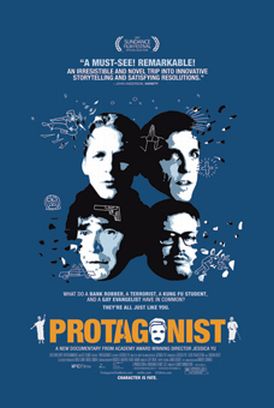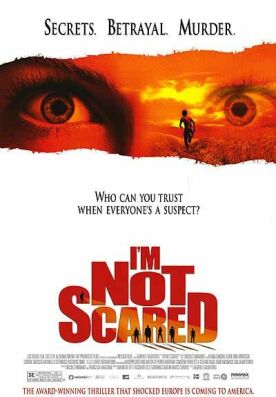Protagonist
Jessica Yu’s documentary, “Protagonist,” attempts enlist the ancient Greek playwright Euripides in support of a very modern case against extremism, which Mis Yu identifies with “certainty.” In her book, people who do things that they shouldn’t do very often do them because they are too confident of their own possession of what they regard as “the truth.” I don’t think Euripides would have bought it, but then that’s just my opinion. Yet the showman in him might have enjoyed the acting out of the stories the film has to tell by wooden “rod-puppets,” made up by Janie Geiser to look a bit like the masks of Greek tragedy, and the snatches of his own dialogue, read in Ancient Greek by Marina Sirtis and Chris Diamantopolous, that punctuate the film. If so, however, we can be pretty sure that he would not have confused the self-improving conversion narratives of the four ex-extremists that make up the majority of the film with tragedy.
Part of the problem is that the four have too little in common. Only one of them, Hans Joachim Klein, is an extremist in the ordinary sense of the term. A former member of the Baader-Meinhof gang who was involved in the kidnaping by Carlos “the Jackal” of oil ministers from an OPEC meeting in Vienna in 1975, he gives the most interesting interview because his political views were first formed and then recanted at least partly on the basis of reasoned choice. But even he is treated too much like a psychological case study, as if early childhood experience — his mother was a Holocaust survivor who committed suicide before he was two years old while his father was a policeman and Nazi sympathizer — determined that he would become a terrorist.
This psychologizing is even more pronounced in the cases of the other three men, who are not terrorists or even, in my view, extremists. One, Joe Loya, is a former bank robber who claims to have been driven to his life of crime by a violent and abusive father. Striking back at his father with a knife felt good. So did robbing banks. The two feelings came to be identified in his mind. Another, Mark Pierpont, blames his strict religious upbringing for the many years he spent as a missionary, trying to “convert” homosexuals — both to fundamentalist Christianity and to heterosexuality — before he was finally driven to acknowledge, in spite of the wife and child he had acquired along the way, his own homosexuality. The fourth, Mark Salzman, is the most out of place in this company. Always small for his age, he was mercilessly bullied as a child and so enrolled in a martial arts course which taught him self-defense techniques and, therefore, confidence. Gradually he came to the realization that his teacher was a dangerous fanatic and turned away from him — though not, apparently, from the martial arts.
The only thing these four have in common is that all have faced a moment of doubt about something they have committed their lives to which has led them to re-think that commitment. Along with this doubt has come another, naturally enough, about the sense of certainty that led them to make the commitment in the first place. But that doesn’t mean we should take their views as definitive. Some such sense, if not of certainty then of its practical equivalent, is necessary to make any commitment. This doesn’t mean that there can be no doubt, only that doubt is not allowed to over-rule belief in the truth of the thing that is also doubted. There’s nothing “extreme” about that.
Surely the question that ought to concern us is not whether or not we think we know the truth — since pretty much everybody, Jessica Yu not excepted, thinks he does — but whether or not it is really true? Take, for example, her confident (if not fanatical) belief that the kind of madness Euripides sees as possessing those who are doomed to destruction is identifiably the same thing, or at least the same kind of thing, as the certainty of the fanatic. Not true. That fanatics may be possessed with some kind of madness we may readily admit. But this cannot be identified with their belief in something, since there are always plenty of people who believe more or less fervently in the same thing — whether it’s true or false — but who are not fanatics and do not do destructive things on account of their belief.
In short, “Protagonist” is barking up the wrong tree, but its belief in a fashionable falsehood is not only not fanatical, it also doesn’t prevent the movie from being frequently engaging and even entertaining, simply as a glimpse into the lives of four passionate people who had to learn to moderate their passion in order to go on living with themselves and others. That seems to me way too ordinary a human experience to qualify as a narrative about “extremism.”
Discover more from James Bowman
Subscribe to get the latest posts to your email.







